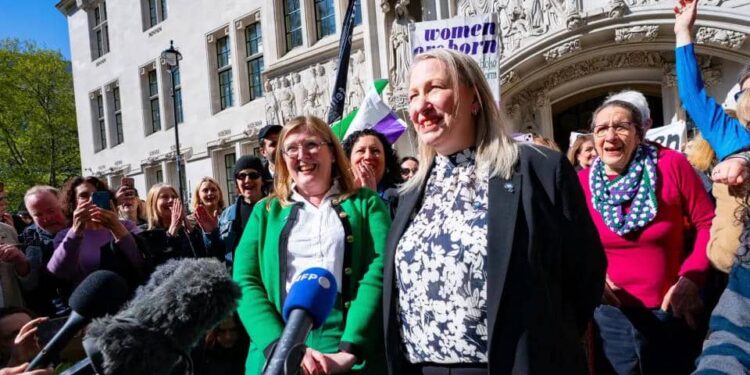By Enyichukwu Enemanna
A woman is someone biologically born female, the UK Supreme Court ruled on Wednesday, excluding transgender people from the legal definition in a long-running dispute between a feminist group and the Scottish government.
Several women’s groups that supported the appeal celebrated outside the court and hailed it as a major victory in their effort to protect spaces designated for women.
“Everyone knows what sex is and you can’t change it,” said Susan Smith, co-director of For Women Scotland, which brought the case.
“It’s common sense, basic common sense, and the fact that we have been down a rabbit hole where people have tried to deny science and to deny reality, hopefully this will now see us back to reality.”
Five judges ruled unanimously that the UK Equality Act means trans women can be excluded from some groups and single-sex spaces, such as changing rooms, homeless shelters, swimming areas, and medical or counselling services provided only to women.
The ruling means that a transgender person with a certificate recognising them as female should not be considered a woman for equality purposes.
The decision brings some clarity in the UK to a contentious issue that has polarised politics in other countries, particularly the US. Republican-controlled states in the past four years have been banning gender-affirming care for minors, barring transgender women and girls from sports competitions aligned with their gender, and restricting which public bathrooms transgender people can use.
The case stems from a 2018 law passed by the Scottish Parliament stating that 50% of the membership of the boards of Scottish public bodies should be women.
Transgender women with gender recognition certificates were to be included in meeting the quota.
For Women Scotland argued that the Scottish officials’ redefinition of “woman” went beyond the Parliament’s powers. However, Scottish officials later issued new guidance stating that the definition of woman included someone with a gender recognition certificate.
“Interpreting ‘sex’ as certificated sex would cut across the definitions of ‘man’ and ‘woman’… and, thus, the protected characteristic of sex in an incoherent way,” Justice Patrick Hodge said during the ruling. “It would create heterogeneous groupings.”
The campaign group Scottish Trans said it was “shocked and disappointed” by the ruling, claiming it would undermine legal protections for transgender people enshrined in the 2004 Gender Recognition Act.
Maggie Chapman, a Green Party lawmaker in the Scottish Parliament, said the ruling was “deeply concerning” for human rights and “a huge blow to some of the most marginalised people in our society.”
“Trans people have been cynically targeted and demonised by politicians and large parts of the media for far too long,” she said. “This has contributed to attacks on longstanding rights and attempts to erase their existence altogether.”
The challenge was initially rejected by a court in 2022, but For Women Scotland was granted permission last year to take its case to the Supreme Court.



































